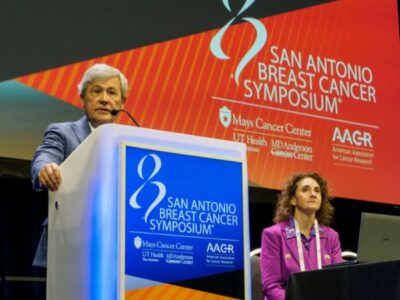The 2023 San Antonio Breast Cancer Symposium (SABCS), held Dec. 5-9 at the city’s Henry B. Gonzalez Convention Center, had a record-setting attendance with 10,874 registered attendees from 102 countries.
A novel three-drug combination achieved notable responses in patients with advanced HER2-negative breast cancer, according to new research directed by investigators from the Johns Hopkins Kimmel Cancer Center.
Rice University researchers in the lab of chemist Han Xiao have identified a promising new immunological pathway to treat stubborn bone tumors, one of most prevalent forms of metastases in breast cancer patients.
The current standard of care for identifying targetable mutations in cancer treatment is to conduct molecular profiles on tumor tissue samples, but a study published in JAMA Network Open indicates that adding liquid biopsy testing for circulating tumor DNA mutations increases targetable mutation detection rates.
Breast surgical oncologist Mediget Teshome was named chief of breast surgery and director of breast health at UCLA Health.
Soy compounds called isoflavones are among the plant-derived compounds that may significantly reduce the risk of breast cancer recurrence or death, according to a meta-analysis co-directed by investigators from the Johns Hopkins Kimmel Cancer Center.
The phase III INAVO120 study evaluating inavolisib in combination with palbociclib (Ibrance) and fulvestrant as a first-line treatment for people with PIK3CA-mutated, hormone receptor (HR)-positive, HER2-negative, endocrine-resistant, locally advanced or metastatic breast cancer, demonstrated positive results.
The phase III KATHERINE study in people with HER2-positive early-stage breast cancer (eBC) who have residual invasive disease following neoadjuvant (before surgery) treatment demonstrated positive long-term follow-up data.
Aditya Bardia, a breast medical oncologist and physician scientist who specializes in developing novel targeted and personalized therapies, joined the David Geffen School of Medicine at UCLA and the UCLA Health Jonsson Comprehensive Cancer Center, where he will assume several leadership roles across the institution.
Long-term follow-up data from the phase III KATHERINE study in people with HER2-positive early-stage breast cancer who have residual invasive disease following neoadjuvant treatment showed that a statistically significant and clinically meaningful improvement in overall survival, a secondary endpoint, was observed with adjuvant Kadcyla (ado-trastuzumab emtansine) compared to Herceptin (trastuzumab).






